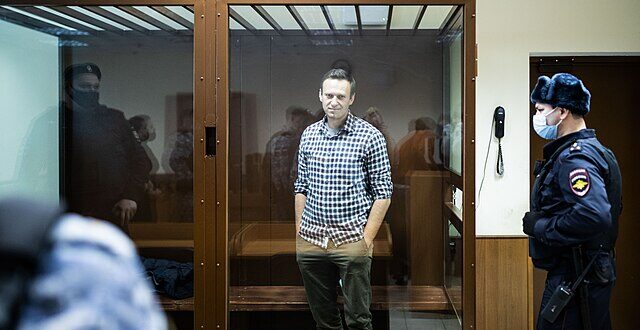“The regime wanted him dead,” a former Kremlin official said. Navalny previously fell ill after being poisoned with nerve agent.
by Susan Katz Keating
Moscow has adopted a defensive mode regarding the sudden death of Kremlin critic Alexei Navalny, saying the activist was “fine” before he collapsed inside a Russian prison on Friday. Concurrently, a prominent Russian politician blamed the U.S. and E.U. for the demise of the charismatic activist, without citing proof.
Russian authorities announced on Feb. 16 that the 47-year-old Navalny fainted and died after going for a walk inside the “Polar Wolf” Arctic penal colony.
Navalny’s death came as a surprise, Russian authorities indicated, claiming that the longtime Kremlin foe had not been left untreated from any illness.
“Navalny had no health complaints and there were no medical requests made by his relatives before the incident,” the Russian state news agency, TASS, reported in a “FACTBOX” on Friday.
“The inmate A.A. Navalny started to feel unwell after a walk and almost immediately lost consciousness at correctional facility No. 3 on Feb. 16,” the Yamal-Nenets autonomous district prison service said. “Medical staff arrived immediately, an ambulance was called. None of the resuscitation efforts yielded positive results.”
Leaders around the world had stark words for Moscow regarding Navalny’s death.
“Russia is responsible for this,” said U.S. Secretary of State Antony Blinken.
“It’s clear he was killed by Putin, like thousands of others who were tortured because of this one creature. Putin doesn’t care who dies, as long as he maintains his position,” said Ukrainian President Volodymyr Zelensky.
“Whatever your thoughts about Alexey @Navalny as the politician, he was just brutally murdered by the Kremlin,” Latvian President Edgars Rinkevics wrote on the X social media platform. “That’s a fact and that is something one should know about the true nature of Russia’s current regime.”
The speaker of Russia’s lower house of parliament pointed a finger at U.S. and E.U. leaders.
“Washington and Brussels are to blame for Navalny’s death,” Vyacheslav Volodin wrote on Telegram, without explaining precisely how they allegedly killed him. The “copycat accusations by the heads of unfriendly states” that the Kremlin was involved is proof that they themselves are guilty, Volodin wrote.
The pro-Kremlin party United Russia told other lawmakers in the State Duma to be careful of what they said about Navalny’s death, according to the Russian-language Agentstvo news agency.
Deputies were told to “keep strictly in line with the Federal Prison Service’s version [or] better to refrain from commenting at all,” according to a translation of the news report. The message was sent to deputies within half an hour after the Federal Penitentiary Service announced Navalny death, the news agency wrote.
Navalny was healthy as of Feb. 15, Russian officials said.
“Blogger Alexey Navalny, who died in prison on Friday, felt quite well and did not complain about health problems the day before when he took part in a Vladimir Region Court session via a video link,” according to TASS, citing a court press officer.
“Yesterday, he took part in a court session, he felt well and did not complain about health problems. He spoke actively, arguing in support for his position,” a press service employee said.
The Russian-language independent agency Sotavision published a video it said was filmed on Feb. 15 of Navalny appearing in court via video link, where he seemed in good spirits. In the excerpt below, he is laughing and joking with court officials.
Navalny returned to Moscow from Germany in 2021, after he fell seriously ill from being poisoned with a nerve agent. Since then, he was convicted three times on charges he said were politically motivated. The Putin challenger initially was convicted of contempt of court and fraud in raising election campaign funds, the Kremlin said on Friday. In August 2023, he was found guilty of creating an “extremist community,” the Kremlin said, without describing what that entailed. The conviction landed him inside the Polar Wolf colony.
Russian authorities said that the prison offers sufficient food and warmth to inmates, but the facility is known for extreme strictness. Punishments reportedly include dousing prisoners with water cannons while they stand outside in sub-zero winters.
Although Navalny on the surface was in good spirits there, the conditions took a toll on him, a former senior Kremlin official told The Moscow Times.
Navalny had been in and out of solitary confinement, spending a total of 300 days in a “punishment cell” at the penal colony.
“The regime wanted him dead. That’s why it happened, that’s why it was allowed to happen,” the former official said.
“It would seem that the conditions were too harsh. Three hundred days in a punishment cell is a lot,” the official said, asking not to be named.
Russian President Vladimir Putin was informed about “the incident” involving Navalny’s death, Kremlin Spokesman Dmitry Peskov said. Prison officials and the Russian Investigative Committee are examining the issue, he noted.
“There is a certain set of rules, which everyone is now being guided by,” Peskov said.
Navalny died shortly before a national election that is expected to keep former KGB man Putin in power through 2030.
The Kremlin did not immediately respond to a request for comment from Soldier of Fortune.
Susan Katz Keating is publisher and editor in chief of Soldier of Fortune.
 Soldier of Fortune Magazine The Journal of Professional Adventurers
Soldier of Fortune Magazine The Journal of Professional Adventurers






